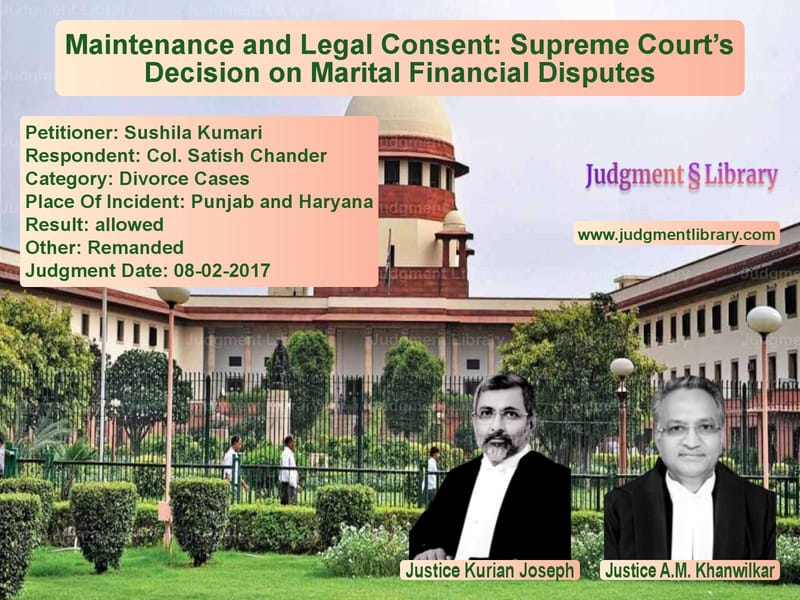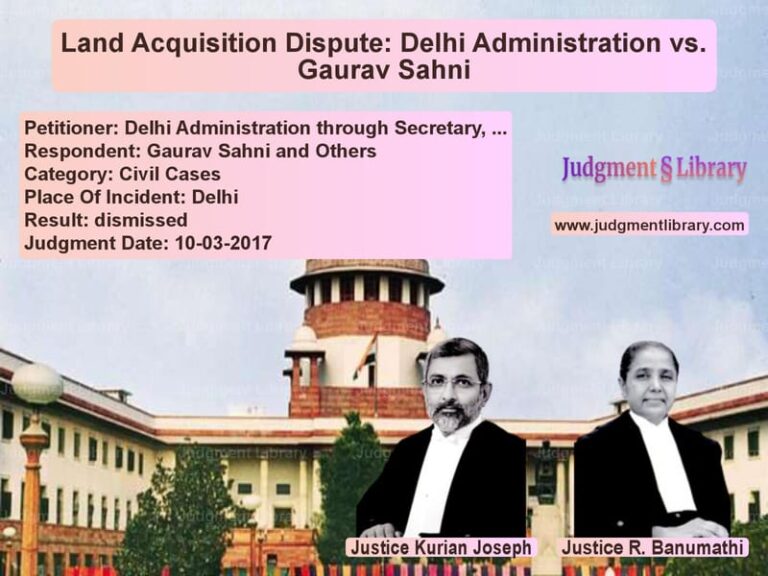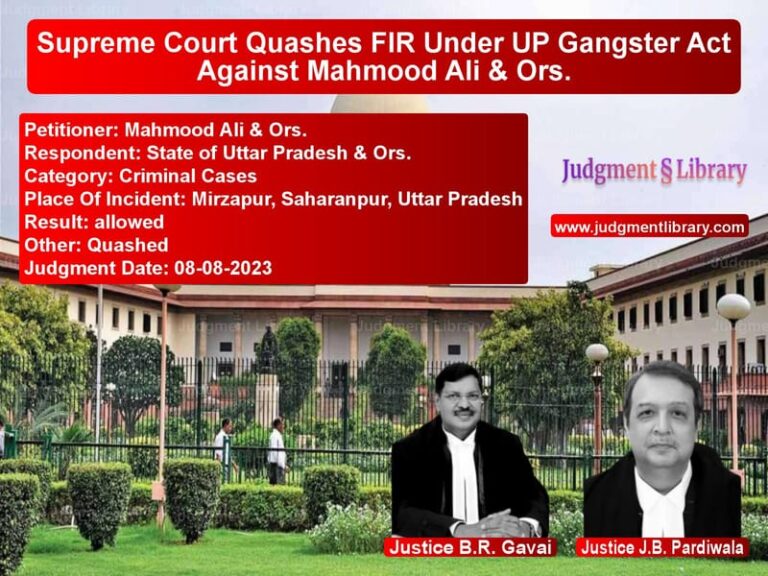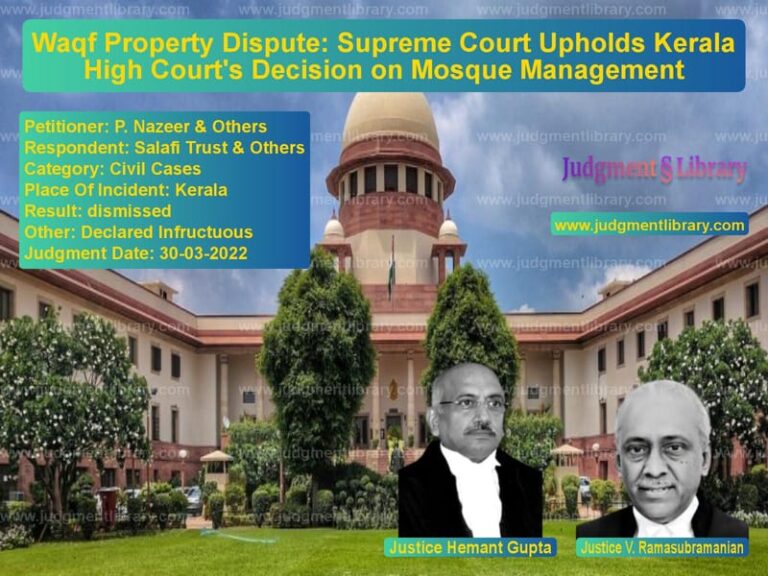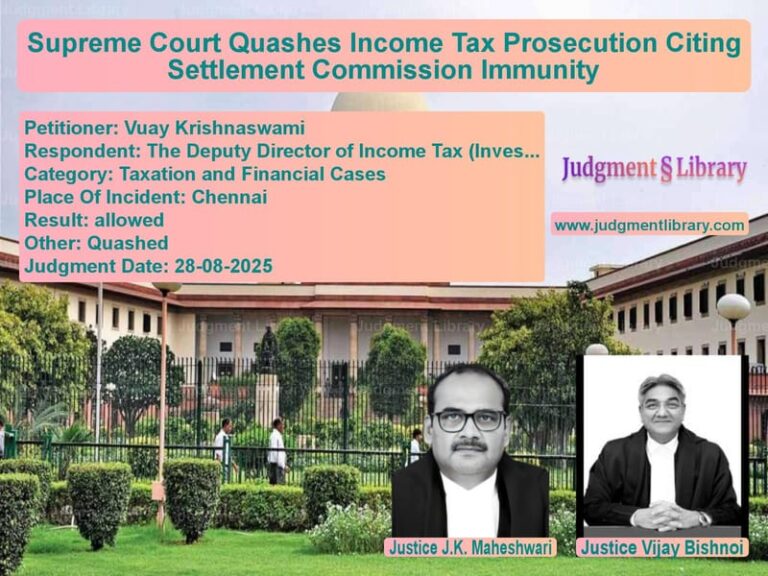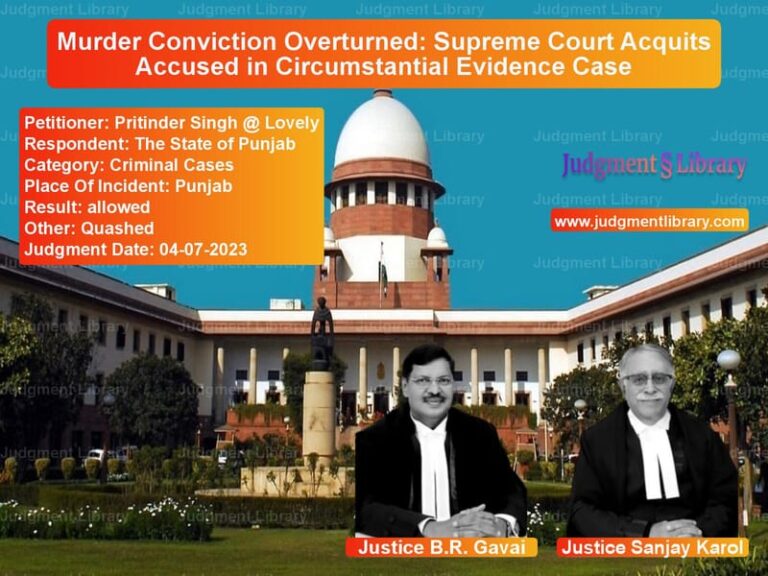Maintenance and Legal Consent: Supreme Court’s Decision on Marital Financial Disputes
The Supreme Court of India, in its judgment dated February 8, 2017, delivered a crucial verdict in the case of Sushila Kumari vs. Col. Satish Chander. The case revolved around a dispute over maintenance payments and whether an earlier settlement recorded by the High Court was made with the proper consent of the appellant.
The Supreme Court ruled in favor of remanding the case to the High Court, allowing a fresh review of the settlement agreement. The judgment emphasized the importance of voluntary consent in legal agreements, particularly in financial settlements between spouses.
Background of the Case
The dispute arose between Sushila Kumari and her estranged husband, Col. Satish Chander. The primary issues in the case involved:
- The amount of maintenance to be paid to the appellant.
- The alleged consent given by the appellant regarding the settlement recorded in the High Court.
- The withdrawal of pending litigation between the parties.
The case was initially heard by the Punjab and Haryana High Court, which recorded a settlement agreement between the parties. According to the High Court’s judgment:
“Lt. Col. Satish Chander undertakes to pay Rs. 21,000 per month w.e.f. today as maintenance, which shall be credited to the bank account of Smt. Sushila Kumari every month through the salary/pension account of Lt. Col. Satish Chander. He further undertakes that after every five years, he will increase the amount of maintenance by Rs. 2,000 automatically.”
The High Court further stated that both parties had agreed to withdraw all pending litigation except for the divorce petition.
Appellant’s Arguments
The appellant, Sushila Kumari, challenged the High Court’s order, arguing:
- The facts recorded by the High Court regarding the settlement were factually incorrect.
- She never agreed to withdraw pending cases beyond the settlement of maintenance.
- The court misrepresented her position by stating that she had agreed to withdraw all litigation.
- Her counsel had never consented to such an agreement, and she had refused to sign any settlement.
Respondent’s Arguments
The respondent, Col. Satish Chander, defended the High Court’s decision, arguing:
- The settlement was made in good faith and should be upheld.
- The appellant had agreed to the terms in open court.
- The withdrawal of pending cases was part of the settlement to avoid prolonged litigation.
Supreme Court’s Ruling
The Supreme Court found merit in the appellant’s arguments and ruled that the High Court’s order should be reconsidered. The key observations were:
- The appellant’s lawyer submitted an affidavit confirming that she had never agreed to withdraw all cases.
- Consent must be explicit and voluntary; courts cannot presume agreement on crucial legal matters.
- Since serious disputes arose regarding whether the agreement was valid, the case must be remitted to the High Court for reconsideration.
The Court ruled:
“Having regard to the averments made in the application for recall, it is fairly clear that it cannot be said that there is no ground made out for recalling the order dated 26.08.2015.”
The Supreme Court set aside the High Court’s decision and directed it to:
- Re-examine the issue of consent.
- Allow the appellant to present evidence regarding her objections.
- Decide the matter based on proper legal principles.
Impact of the Judgment
The ruling has several important implications:
- Clarifies that consent must be voluntary in legal agreements.
- Ensures that financial settlements in matrimonial disputes are fair and transparent.
- Prevents courts from assuming agreement when a party clearly objects to settlement terms.
Conclusion
The Supreme Court’s judgment in Sushila Kumari vs. Col. Satish Chander reinforces the principle that legal agreements require free and voluntary consent. By remanding the case to the High Court, the ruling ensures that financial disputes in matrimonial cases are fairly adjudicated based on explicit agreements rather than assumed consent.
Don’t miss out on the full details! Download the complete judgment in PDF format below and gain valuable insights instantly!
Download Judgment: Sushila Kumari vs Col. Satish Chander Supreme Court of India Judgment Dated 08-02-2017.pdf
Direct Downlaod Judgment: Direct downlaod this Judgment
See all petitions in Alimony and Maintenance
See all petitions in Mutual Consent Divorce
See all petitions in Domestic Violence
See all petitions in Judgment by Kurian Joseph
See all petitions in Judgment by A M Khanwilkar
See all petitions in allowed
See all petitions in Remanded
See all petitions in supreme court of India judgments February 2017
See all petitions in 2017 judgments
See all posts in Divorce Cases Category
See all allowed petitions in Divorce Cases Category
See all Dismissed petitions in Divorce Cases Category
See all partially allowed petitions in Divorce Cases Category

